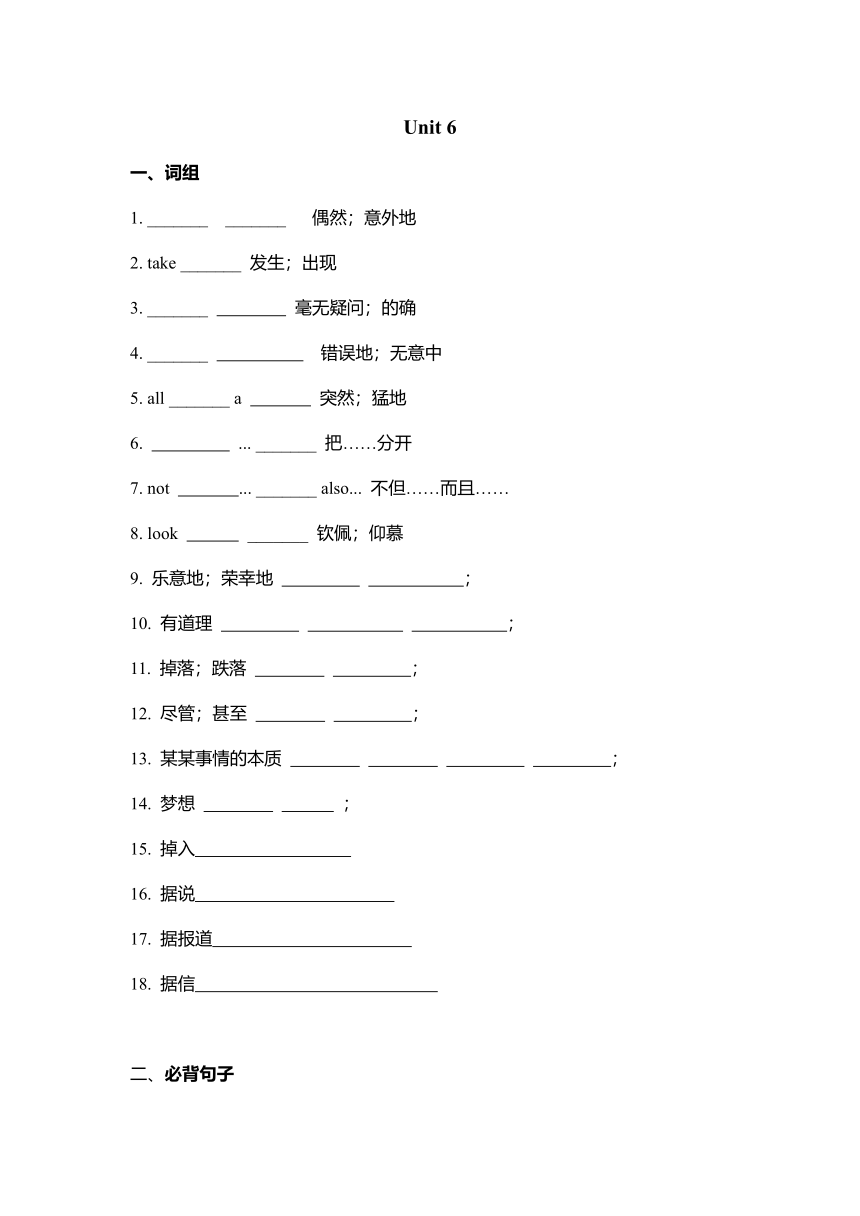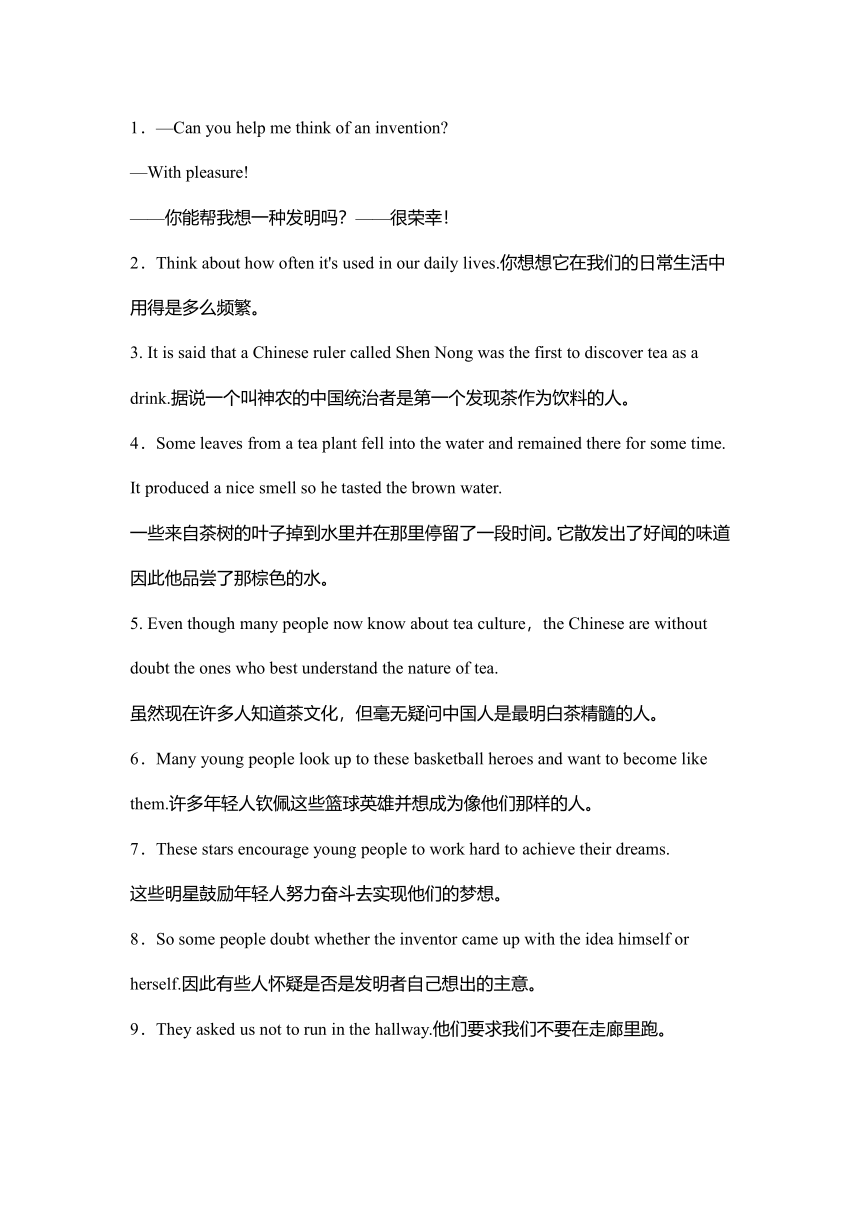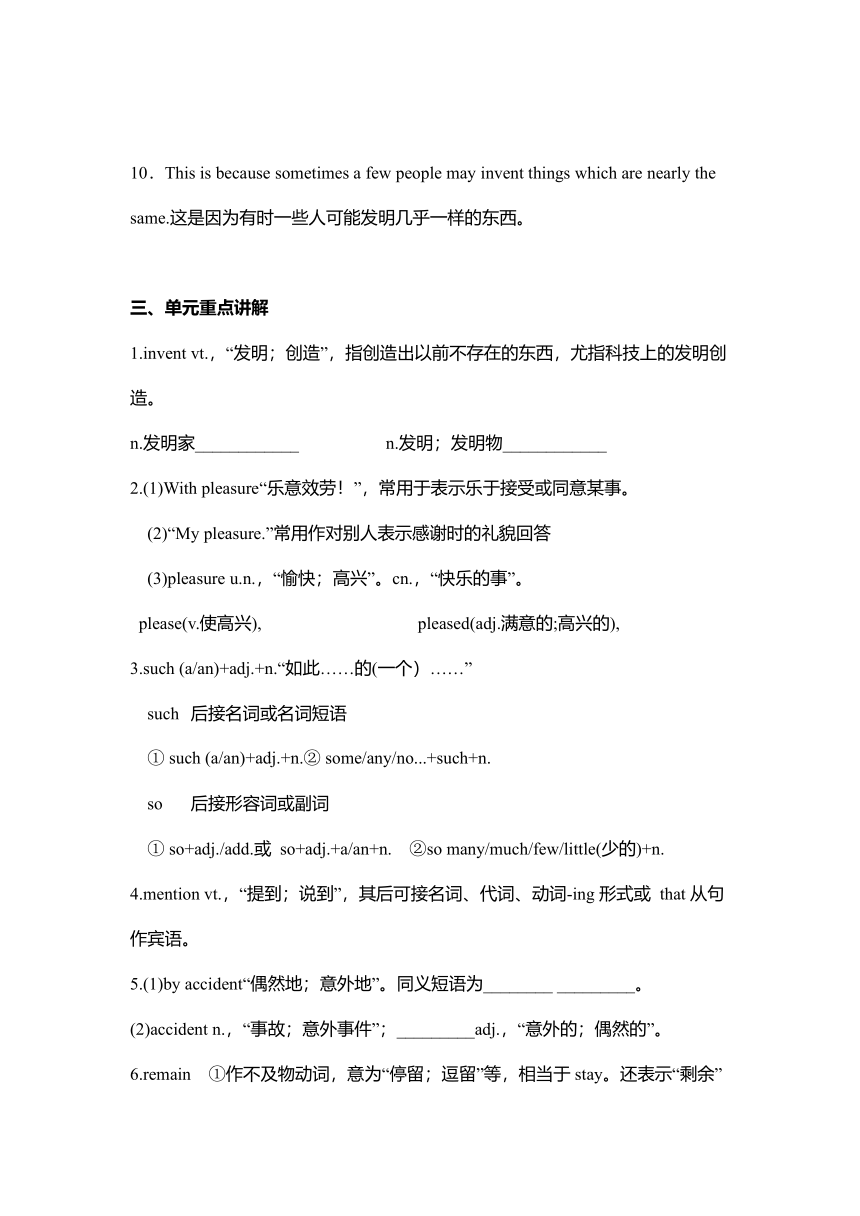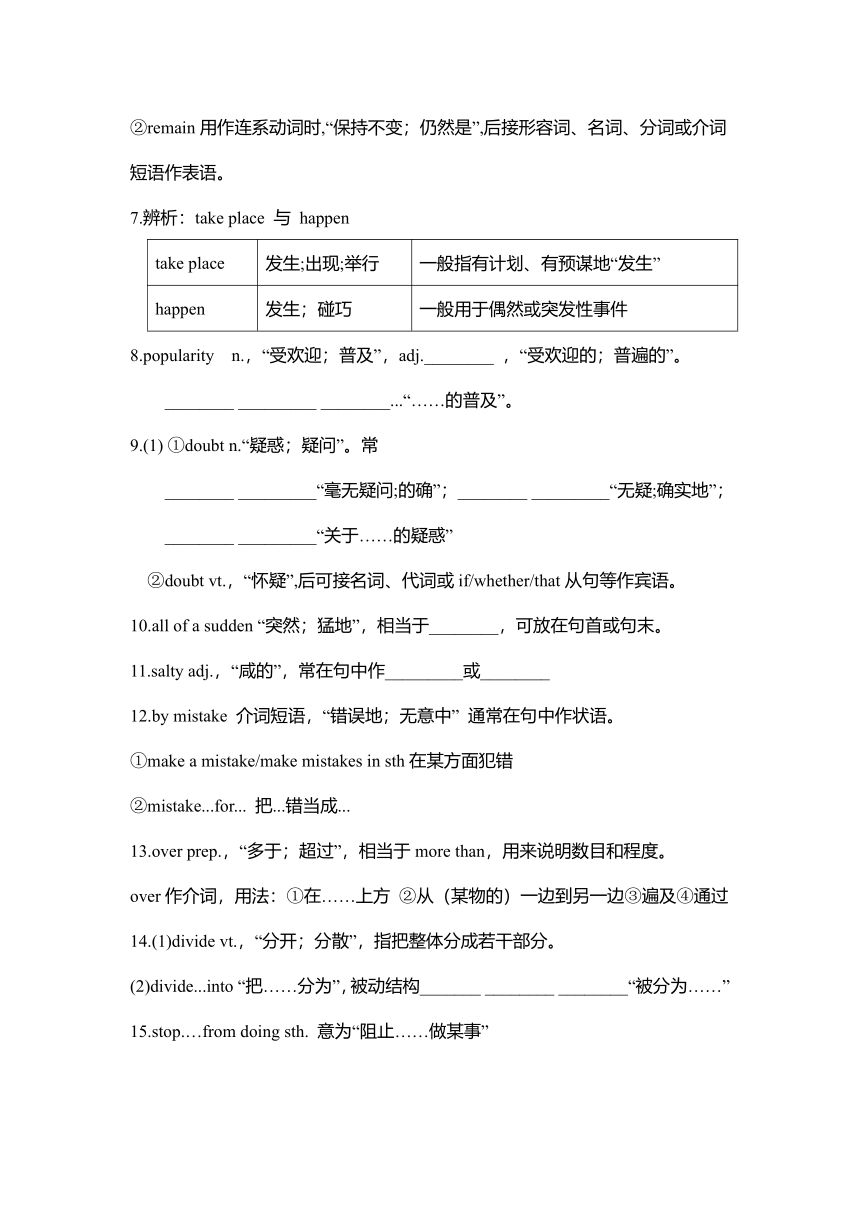Unit 6 When was it invented? 单元基础同步练习(无答案)
文档属性
| 名称 | Unit 6 When was it invented? 单元基础同步练习(无答案) |  | |
| 格式 | docx | ||
| 文件大小 | 26.8KB | ||
| 资源类型 | 教案 | ||
| 版本资源 | 人教新目标(Go for it)版 | ||
| 科目 | 英语 | ||
| 更新时间 | 2023-10-27 13:30:32 | ||
图片预览




文档简介
Unit 6
词组
1. _______ _______ 偶然;意外地
2. take _______ 发生;出现
3. _______ 毫无疑问;的确
4. _______ 错误地;无意中
5. all _______ a 突然;猛地
6. ... _______ 把……分开
7. not ... _______ also... 不但……而且……
8. look _______ 钦佩;仰慕
9. 乐意地;荣幸地 ;
10. 有道理 ;
11. 掉落;跌落 ;
12. 尽管;甚至 ;
13. 某某事情的本质 ;
14. 梦想 ;
15. 掉入
16. 据说
17. 据报道
18. 据信
二、必背句子
1.—Can you help me think of an invention
—With pleasure!
——你能帮我想一种发明吗?——很荣幸!
2.Think about how often it's used in our daily lives.你想想它在我们的日常生活中用得是多么频繁。
3. It is said that a Chinese ruler called Shen Nong was the first to discover tea as a drink.据说一个叫神农的中国统治者是第一个发现茶作为饮料的人。
4.Some leaves from a tea plant fell into the water and remained there for some time. It produced a nice smell so he tasted the brown water.
一些来自茶树的叶子掉到水里并在那里停留了一段时间。它散发出了好闻的味道因此他品尝了那棕色的水。
5. Even though many people now know about tea culture,the Chinese are without doubt the ones who best understand the nature of tea.
虽然现在许多人知道茶文化,但毫无疑问中国人是最明白茶精髓的人。
6.Many young people look up to these basketball heroes and want to become like them.许多年轻人钦佩这些篮球英雄并想成为像他们那样的人。
7.These stars encourage young people to work hard to achieve their dreams.
这些明星鼓励年轻人努力奋斗去实现他们的梦想。
8.So some people doubt whether the inventor came up with the idea himself or herself.因此有些人怀疑是否是发明者自己想出的主意。
9.They asked us not to run in the hallway.他们要求我们不要在走廊里跑。
10.This is because sometimes a few people may invent things which are nearly the same.这是因为有时一些人可能发明几乎一样的东西。
三、单元重点讲解
1.invent vt.,“发明;创造”,指创造出以前不存在的东西,尤指科技上的发明创造。
n.发明家____________ n.发明;发明物____________
2.(1)With pleasure“乐意效劳!”,常用于表示乐于接受或同意某事。
(2)“My pleasure.”常用作对别人表示感谢时的礼貌回答
(3)pleasure u.n.,“愉快;高兴”。cn.,“快乐的事”。
please(v.使高兴), pleased(adj.满意的;高兴的),
3.such (a/an)+adj.+n.“如此……的(一个)……”
such 后接名词或名词短语
① such (a/an)+adj.+n.② some/any/no...+such+n.
so 后接形容词或副词
① so+adj./add.或 so+adj.+a/an+n. ②so many/much/few/little(少的)+n.
4.mention vt.,“提到;说到”,其后可接名词、代词、动词-ing形式或 that从句作宾语。
5.(1)by accident“偶然地;意外地”。同义短语为________ _________。
(2)accident n.,“事故;意外事件”;_________adj.,“意外的;偶然的”。
6.remain ①作不及物动词,意为“停留;逗留”等,相当于stay。还表示“剩余”
②remain用作连系动词时,“保持不变;仍然是”,后接形容词、名词、分词或介词短语作表语。
7.辨析:take place 与 happen
take place 发生;出现;举行 一般指有计划、有预谋地“发生”
happen 发生;碰巧 一般用于偶然或突发性事件
8.popularity n.,“受欢迎;普及”,adj.________ ,“受欢迎的;普遍的”。
________ _________ ________...“……的普及”。
9.(1) ①doubt n.“疑惑;疑问”。常
________ _________“毫无疑问;的确”;________ _________“无疑;确实地”;
________ _________“关于……的疑惑”
②doubt vt.,“怀疑”,后可接名词、代词或if/whether/that从句等作宾语。
10.all of a sudden “突然;猛地”,相当于________,可放在句首或句末。
11.salty adj.,“咸的”,常在句中作_________或________
12.by mistake 介词短语,“错误地;无意中” 通常在句中作状语。
①make a mistake/make mistakes in sth在某方面犯错
②mistake...for... 把...错当成...
13.over prep.,“多于;超过”,相当于more than,用来说明数目和程度。
over作介词,用法:①在……上方 ②从(某物的)一边到另一边③遍及④通过
14.(1)divide vt.,“分开;分散”,指把整体分成若干部分。
(2)divide...into “把……分为”,被动结构_______ ________ ________“被分为……”
15.stop.…from doing sth. 意为“阻止……做某事”
同义短语为 _______/_______..._______ _______ _______.
16.(1)look up to“钦佩;仰慕”。 to为介词其后可接名词或代词作宾语。
look up to还可表示“仰起头看……”。
17.translate vt,“翻译”, _________ (n.翻译) _________(n.翻译家;译者)
“把……翻译成……”________ _________
18.(1)encourage sb.to do sth. “鼓励某人做某事”。
基础练习
一、单选
1. –Who _________ the telephone
-It _________ by Bell.
A. was invented; was invented B. invented; invented
C. invented; was invented D. was invented; invented
2. Chinese _________ by more and more people from all over the world today.
A. learn B. learned C. is learned D. was learned
3. -It's reported that some capsules (胶囊) are really bad for our health.
-Sounds terrible. Hopefully the problem _________ as soon as possible.
A. is solved B. has solved C. was solved D. will be solved
4. On weekends we help Mother with housework in the kitchen _________ she can enjoy herself by searching the Internet.
A. after B. until C. that D. so that
5. The maths problem is so hard. I really don't know _________.
A. how to do it B. how to do
C. what to do it D. what to do
6.—Could you please sweep the floor
— ______ .I'm busy babysitting my sister.
A.Sorry,you can't B.Yes,sure C.Yes,I can D.Sorry,I can't
7.The mobile phone has influenced people’s life a lot since it ______.
A.invents B.invented
C.is invented D.was invented
8.A year has four seasons and it______twelve different star signs.
A.divided into
B.is dividing into
C.dividing into
D.is divided into
9.—Do you know ______ in ancient China
—I have no idea,but I know people once used tree bark (树皮) to make paper.
A.how paper was made B.how was paper made
C.what paper was made from D.what was paper made from
10.At first, the customers thought the potatoes weren’t ______.
A.enough thin B.thin enough C.enough thick D.salt enough
二、完形填空
Zhang Ming and Zhang Peng are twin brothers. When they were young, they were interested in ____1____ Chinese culture like Chinese clay art and Beijing
Opera. In these art forms, they could ____2____ something to learn. One day, they met an old man ____3____ is good at shadow puppet play (皮影戏). ____4____ they saw the play, they fell in love with it. So they decided to ____5____ the old man.
After 5 years’ study, they could ____6____ by themselves. When they acted in the village, the villagers sat in front of a white screen and watched the plays happily. Zhang Ming usually stood ____7____ the white screen and held different kinds of characters. Zhang Peng did the voices of the different characters. ____8____ of the villagers liked their performances and hoped they could ____9____ performing. “It’s not easy” Zhang Ming said. “We can’t get much money from it. Sometimes we even have ____10____ money to buy tools we need. But we want to keep this art form alive. So we will stick to it no matter how hard it is!”
1.A.young B.traditional C.new D.modern
2.A.find B.make C.hear D.want
3.A.which B.when C.where D.who
4.A.Unless B.As soon as C.Even though D.In order that
5.A.play with B.hear from C.learn from D.depend on
6.A.dance B.write C.perform D.report
7.A.on B.in C.under D.behind
8.A.All B.None C.Both D.Neither
9.A.put off B.end up C.keep on D.take up
10.A.much B.little C.enough D.some
三、用括号内所给单词的适当形式填空
1.The cake _________(smell)terrible. So I didn't eat it.
2.—Why didn't you go to the party?
—Because I _________(not invite).
3.She found that her son had a _________(music) talent.
4.These _________(Canada)can speak Chinese very well.
5.The temperature in the world _________(rise)in the past years.
6.The girl surfs the Internet for ________ (please).
7.Knives are used for ___________ (cut) things.
8.What do you think is the greatest __________(invent) of the twentieth century
9.There are different kinds of __________ (zipper) in the shop.
10.Jim was seen ____________(enter) the room.
四、完成句子
1.大地震后,英雄一个接一个地出现。
appeared one after another after the big .
2.薯条是一个名叫乔治克拉姆的厨师发明的。
Potato chips a cook George Crum.
3.顾客认为土豆不够咸。
Customers thought the potatoes were not .
4.茶在六、七世纪期间被带到日本和朝鲜。
Tea to Japan and Korea during the sixth and .
5.我们的父母建议我们晚上不要独自外出。
Our parents advised us alone at night.
6. 一些叶子从茶树上落入这水里并在里面停留了一段时间。
Some leaves from a tea plant _________ _________ the water and remained there for some time.
它发出一种香味,所以他尝了尝这种褐色的水。
It _________ a nice smell so he tasted the brown water.
8.数千年后,“茶圣”陆羽在他的《茶经》一书中提到了神农。
A few thousand years later,Lu Yu,"the saint of tea", _________ Shen Nong in his book ChaJing.
9.人们认为茶在6世纪和7世纪期间被带到了朝鲜和日本。
It is _________ that tea was _________ to Korea and Japan during the 6th and 7th centuries.
10.中国到西方国家的茶叶贸易出现在19世纪。
The tea trade from China to Western countries ________ in the 19th century.
词组
1. _______ _______ 偶然;意外地
2. take _______ 发生;出现
3. _______ 毫无疑问;的确
4. _______ 错误地;无意中
5. all _______ a 突然;猛地
6. ... _______ 把……分开
7. not ... _______ also... 不但……而且……
8. look _______ 钦佩;仰慕
9. 乐意地;荣幸地 ;
10. 有道理 ;
11. 掉落;跌落 ;
12. 尽管;甚至 ;
13. 某某事情的本质 ;
14. 梦想 ;
15. 掉入
16. 据说
17. 据报道
18. 据信
二、必背句子
1.—Can you help me think of an invention
—With pleasure!
——你能帮我想一种发明吗?——很荣幸!
2.Think about how often it's used in our daily lives.你想想它在我们的日常生活中用得是多么频繁。
3. It is said that a Chinese ruler called Shen Nong was the first to discover tea as a drink.据说一个叫神农的中国统治者是第一个发现茶作为饮料的人。
4.Some leaves from a tea plant fell into the water and remained there for some time. It produced a nice smell so he tasted the brown water.
一些来自茶树的叶子掉到水里并在那里停留了一段时间。它散发出了好闻的味道因此他品尝了那棕色的水。
5. Even though many people now know about tea culture,the Chinese are without doubt the ones who best understand the nature of tea.
虽然现在许多人知道茶文化,但毫无疑问中国人是最明白茶精髓的人。
6.Many young people look up to these basketball heroes and want to become like them.许多年轻人钦佩这些篮球英雄并想成为像他们那样的人。
7.These stars encourage young people to work hard to achieve their dreams.
这些明星鼓励年轻人努力奋斗去实现他们的梦想。
8.So some people doubt whether the inventor came up with the idea himself or herself.因此有些人怀疑是否是发明者自己想出的主意。
9.They asked us not to run in the hallway.他们要求我们不要在走廊里跑。
10.This is because sometimes a few people may invent things which are nearly the same.这是因为有时一些人可能发明几乎一样的东西。
三、单元重点讲解
1.invent vt.,“发明;创造”,指创造出以前不存在的东西,尤指科技上的发明创造。
n.发明家____________ n.发明;发明物____________
2.(1)With pleasure“乐意效劳!”,常用于表示乐于接受或同意某事。
(2)“My pleasure.”常用作对别人表示感谢时的礼貌回答
(3)pleasure u.n.,“愉快;高兴”。cn.,“快乐的事”。
please(v.使高兴), pleased(adj.满意的;高兴的),
3.such (a/an)+adj.+n.“如此……的(一个)……”
such 后接名词或名词短语
① such (a/an)+adj.+n.② some/any/no...+such+n.
so 后接形容词或副词
① so+adj./add.或 so+adj.+a/an+n. ②so many/much/few/little(少的)+n.
4.mention vt.,“提到;说到”,其后可接名词、代词、动词-ing形式或 that从句作宾语。
5.(1)by accident“偶然地;意外地”。同义短语为________ _________。
(2)accident n.,“事故;意外事件”;_________adj.,“意外的;偶然的”。
6.remain ①作不及物动词,意为“停留;逗留”等,相当于stay。还表示“剩余”
②remain用作连系动词时,“保持不变;仍然是”,后接形容词、名词、分词或介词短语作表语。
7.辨析:take place 与 happen
take place 发生;出现;举行 一般指有计划、有预谋地“发生”
happen 发生;碰巧 一般用于偶然或突发性事件
8.popularity n.,“受欢迎;普及”,adj.________ ,“受欢迎的;普遍的”。
________ _________ ________...“……的普及”。
9.(1) ①doubt n.“疑惑;疑问”。常
________ _________“毫无疑问;的确”;________ _________“无疑;确实地”;
________ _________“关于……的疑惑”
②doubt vt.,“怀疑”,后可接名词、代词或if/whether/that从句等作宾语。
10.all of a sudden “突然;猛地”,相当于________,可放在句首或句末。
11.salty adj.,“咸的”,常在句中作_________或________
12.by mistake 介词短语,“错误地;无意中” 通常在句中作状语。
①make a mistake/make mistakes in sth在某方面犯错
②mistake...for... 把...错当成...
13.over prep.,“多于;超过”,相当于more than,用来说明数目和程度。
over作介词,用法:①在……上方 ②从(某物的)一边到另一边③遍及④通过
14.(1)divide vt.,“分开;分散”,指把整体分成若干部分。
(2)divide...into “把……分为”,被动结构_______ ________ ________“被分为……”
15.stop.…from doing sth. 意为“阻止……做某事”
同义短语为 _______/_______..._______ _______ _______.
16.(1)look up to“钦佩;仰慕”。 to为介词其后可接名词或代词作宾语。
look up to还可表示“仰起头看……”。
17.translate vt,“翻译”, _________ (n.翻译) _________(n.翻译家;译者)
“把……翻译成……”________ _________
18.(1)encourage sb.to do sth. “鼓励某人做某事”。
基础练习
一、单选
1. –Who _________ the telephone
-It _________ by Bell.
A. was invented; was invented B. invented; invented
C. invented; was invented D. was invented; invented
2. Chinese _________ by more and more people from all over the world today.
A. learn B. learned C. is learned D. was learned
3. -It's reported that some capsules (胶囊) are really bad for our health.
-Sounds terrible. Hopefully the problem _________ as soon as possible.
A. is solved B. has solved C. was solved D. will be solved
4. On weekends we help Mother with housework in the kitchen _________ she can enjoy herself by searching the Internet.
A. after B. until C. that D. so that
5. The maths problem is so hard. I really don't know _________.
A. how to do it B. how to do
C. what to do it D. what to do
6.—Could you please sweep the floor
— ______ .I'm busy babysitting my sister.
A.Sorry,you can't B.Yes,sure C.Yes,I can D.Sorry,I can't
7.The mobile phone has influenced people’s life a lot since it ______.
A.invents B.invented
C.is invented D.was invented
8.A year has four seasons and it______twelve different star signs.
A.divided into
B.is dividing into
C.dividing into
D.is divided into
9.—Do you know ______ in ancient China
—I have no idea,but I know people once used tree bark (树皮) to make paper.
A.how paper was made B.how was paper made
C.what paper was made from D.what was paper made from
10.At first, the customers thought the potatoes weren’t ______.
A.enough thin B.thin enough C.enough thick D.salt enough
二、完形填空
Zhang Ming and Zhang Peng are twin brothers. When they were young, they were interested in ____1____ Chinese culture like Chinese clay art and Beijing
Opera. In these art forms, they could ____2____ something to learn. One day, they met an old man ____3____ is good at shadow puppet play (皮影戏). ____4____ they saw the play, they fell in love with it. So they decided to ____5____ the old man.
After 5 years’ study, they could ____6____ by themselves. When they acted in the village, the villagers sat in front of a white screen and watched the plays happily. Zhang Ming usually stood ____7____ the white screen and held different kinds of characters. Zhang Peng did the voices of the different characters. ____8____ of the villagers liked their performances and hoped they could ____9____ performing. “It’s not easy” Zhang Ming said. “We can’t get much money from it. Sometimes we even have ____10____ money to buy tools we need. But we want to keep this art form alive. So we will stick to it no matter how hard it is!”
1.A.young B.traditional C.new D.modern
2.A.find B.make C.hear D.want
3.A.which B.when C.where D.who
4.A.Unless B.As soon as C.Even though D.In order that
5.A.play with B.hear from C.learn from D.depend on
6.A.dance B.write C.perform D.report
7.A.on B.in C.under D.behind
8.A.All B.None C.Both D.Neither
9.A.put off B.end up C.keep on D.take up
10.A.much B.little C.enough D.some
三、用括号内所给单词的适当形式填空
1.The cake _________(smell)terrible. So I didn't eat it.
2.—Why didn't you go to the party?
—Because I _________(not invite).
3.She found that her son had a _________(music) talent.
4.These _________(Canada)can speak Chinese very well.
5.The temperature in the world _________(rise)in the past years.
6.The girl surfs the Internet for ________ (please).
7.Knives are used for ___________ (cut) things.
8.What do you think is the greatest __________(invent) of the twentieth century
9.There are different kinds of __________ (zipper) in the shop.
10.Jim was seen ____________(enter) the room.
四、完成句子
1.大地震后,英雄一个接一个地出现。
appeared one after another after the big .
2.薯条是一个名叫乔治克拉姆的厨师发明的。
Potato chips a cook George Crum.
3.顾客认为土豆不够咸。
Customers thought the potatoes were not .
4.茶在六、七世纪期间被带到日本和朝鲜。
Tea to Japan and Korea during the sixth and .
5.我们的父母建议我们晚上不要独自外出。
Our parents advised us alone at night.
6. 一些叶子从茶树上落入这水里并在里面停留了一段时间。
Some leaves from a tea plant _________ _________ the water and remained there for some time.
它发出一种香味,所以他尝了尝这种褐色的水。
It _________ a nice smell so he tasted the brown water.
8.数千年后,“茶圣”陆羽在他的《茶经》一书中提到了神农。
A few thousand years later,Lu Yu,"the saint of tea", _________ Shen Nong in his book ChaJing.
9.人们认为茶在6世纪和7世纪期间被带到了朝鲜和日本。
It is _________ that tea was _________ to Korea and Japan during the 6th and 7th centuries.
10.中国到西方国家的茶叶贸易出现在19世纪。
The tea trade from China to Western countries ________ in the 19th century.
同课章节目录
- Unit 1 How can we become good learners.
- Section A
- Section B
- Unit 2 I think that mooncakes are delicious!
- Section A
- Section B
- Unit 3 Could you please tell me where the restroom
- Section A
- Section B
- Unit 4 I used to be afraid of the dark.
- Section A
- Section B
- Unit 5 What are the shirts made of?
- Section A
- Section B
- Review of Units 1-5
- Unit 6 When was it invented?
- Section A
- Section B
- Unit 7 Teenagers should be allowed to choose their
- Section A
- Section B
- Unit 8 It must belong to Carla.
- Section A
- Section B
- Unit 9 I like music that I can dance to.
- Section A
- Section B
- Unit 10 You're supposed to shake hands.
- Section A
- Section B
- Review of Units 6-10
- Unit 11 Sad movies make me cry.
- Section A
- Section B
- Unit 12 Life is full of the unexpected
- Section A
- Section B
- Unit 13 We're trying to save the earth!
- Section A
- Section B
- Unit 14 I remember meeting all of you in Grade 7.
- Section A
- Section B
- Review of Units 11-14
